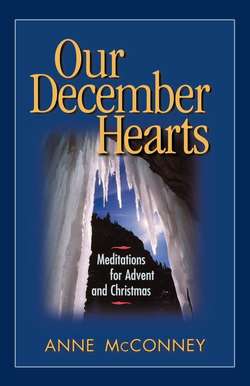Читать книгу Our December Hearts - Anne McConney - Страница 7
На сайте Литреса книга снята с продажи.
NOVEMBER 28 …TO THEE, A WAYFARER
ОглавлениеThe time is uncertain but it is the dead of night. I am alone, surrounded by a labyrinth of dirty brick walls lit by dim bulbs with wire-mesh covers. Graffiti and a few makeshift signs cover the walls, for this is the warehouse district of a large city, a deserted warren of aging buildings tied together by an unruly knot of cobble and asphalt and cracked cement streets.
I prowl through this empty urban night searching for a way out, for there is somewhere I need to reach, some far, bright place that I must find….
I dreamed this dream at intervals over many years. It was never a nightmare; I felt only frustration at a situation that, in real life, probably would have filled me with terror. In my dreams I never reached the shining place, but I rather imagine it may have represented ordination, for after I became a priest the dream stopped and I have never had it since.
The memory of the dream serves to remind me, however, that the mind is a wondrous thing and that we have only begun to scout its mysteries. The mind can take the images of every day and by the alchemy of dreams turn them into symbols of a deeper truth. And one of the most universal of these symbols is that life is a journey. We are all, somewhere deep in our psyches, poor wayfaring strangers. We are pilgrims searching for the way to God, often unaware that we have already found it.
Jesus said, “I am the way,” and added, “No one comes to the Father but by me” (John 14:6)—a statement that has all too often been interpreted to mean that unless one holds the proper opinions about Jesus, one cannot get to heaven.
We need, I think, to move beyond such concepts. Christianity is a complex religion. The “simple gospel” is not simple at all, nor was it understood so in the early church. During those first centuries, the church demanded some three years of intensive study before administering baptism. The theological thought of Paul still engrosses scholars with its intricacy and boldness. In every era across our span of two thousand years, saints, thinkers, and poets have added new insights and understandings to the once-and-forever Good News.
When we speak of Christ, then, as “the way,” I think we need to pause and ask what we mean by that phrase. Way is, after all, one of those slippery little words with several meanings, each of them slightly different. We ask “the way” to our destination; we show a child “the way” to tie his shoes; sometimes we say with pride, “I did it my way,” or speak of “the American way.” Which of these ways do we mean when we talk of Christ?
The answer, of course, is all of them. Christ is the path that leads into the creating mind that made the universe; he is the gateway into love and the bridge that lies across the chasm between human and divine. He is our camino real into the heart of God.
But Christ is more than that; he is also our model and our mentor. Just as we show a child how to perform simple life skills, Christ instructs us and demonstrates for us the far more complicated skills of spiritual living. And, last of all, Christ is the sanctified life within every one of us. Somewhere in the reaches beyond this world, we have agreed to accept the inner fire kindled in us, to take on the daunting and humbling task of continuing Christ's healing and redemptive work, to say with Paul, “It is no longer I who live, but Christ who lives in me” (Galatians 2:20).
So I suggest that the Christ life is the human life and the way it represents is the human way. How could it be otherwise? It is in the human identity of Jesus that God has been revealed, the same human identity that the Athanasian Creed insists has been taken into God.
So we poor pilgrims go on our way, robed in the ragtag glory, the tattered nobility, of our humanity, the garment we now and forever share with God. We stumble and fail and fall because that is what human beings do. We follow the vision that lies behind the sky because that is what human beings do.
We follow the voice that speaks in the night, saying in the words of the beautiful “Jesus Hymn,” “A way am I, to thee a wayfarer.” We ask for no more than this.
